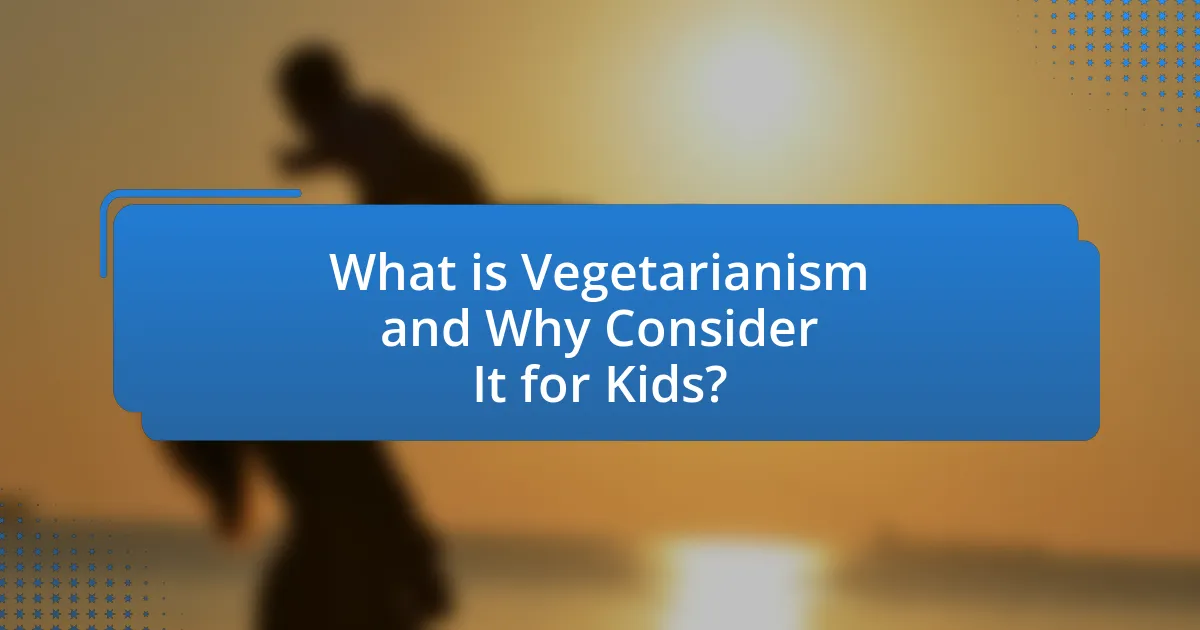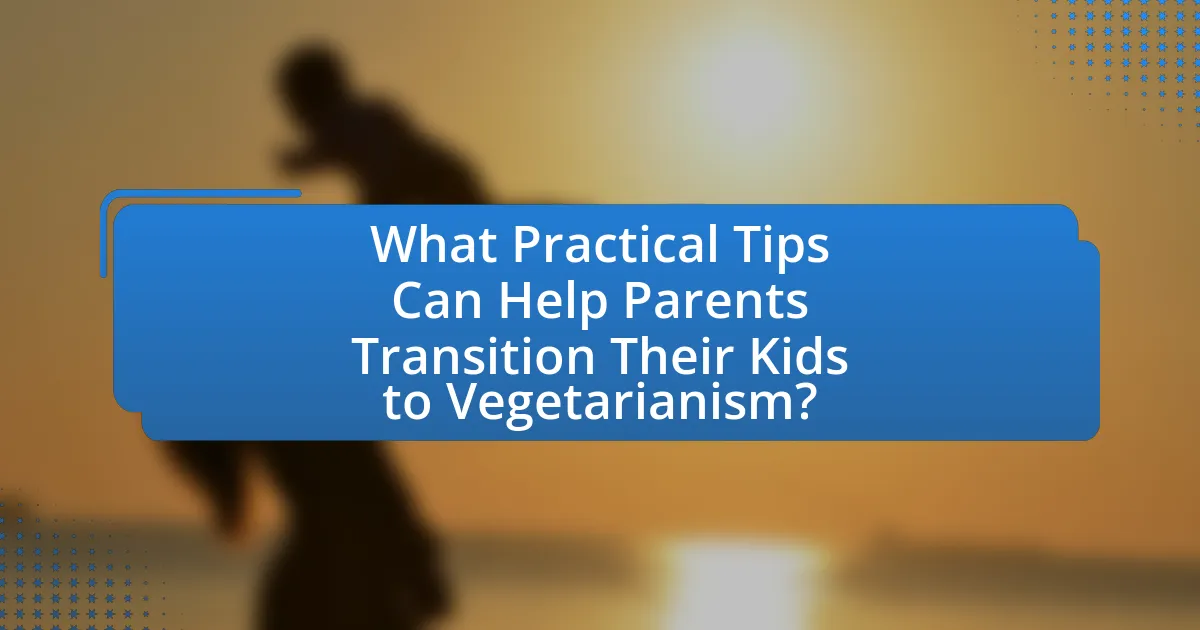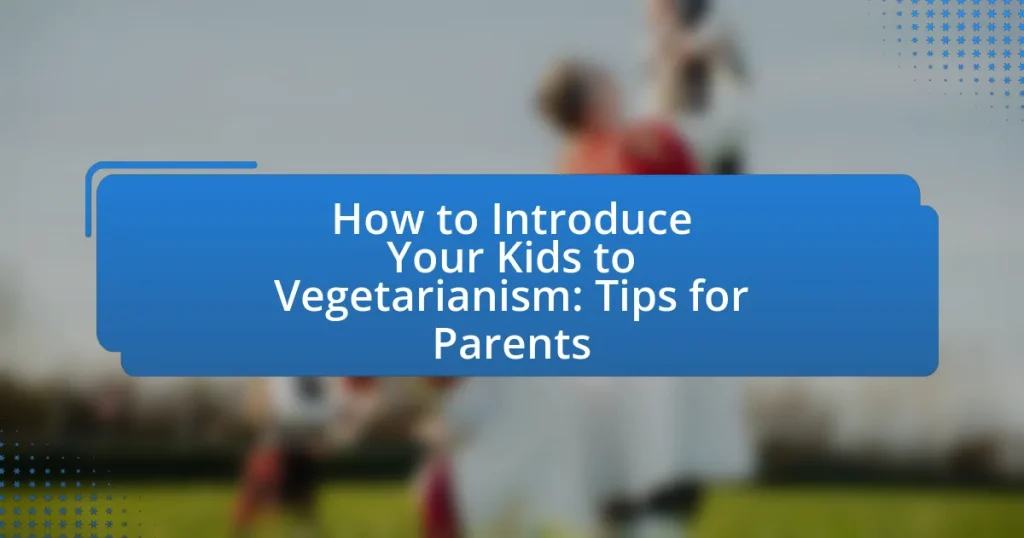Vegetarianism is a dietary practice that excludes meat, fish, and poultry, emphasizing plant-based foods. This article provides parents with practical tips on how to introduce vegetarianism to their children, highlighting the health benefits, nutritional advantages, and environmental awareness associated with a vegetarian diet. It addresses common misconceptions, offers strategies for meal planning, and discusses how to engage children in the transition to vegetarianism. Additionally, the article outlines key nutrients to focus on, ways to make vegetarian meals appealing, and how to handle social situations involving non-vegetarian meals.

What is Vegetarianism and Why Consider It for Kids?
Vegetarianism is a dietary practice that excludes meat, fish, and poultry, focusing instead on plant-based foods such as fruits, vegetables, grains, nuts, and legumes. Considering vegetarianism for kids can promote health benefits, including lower risks of obesity, heart disease, and certain cancers, as supported by research from the American Dietetic Association, which states that well-planned vegetarian diets can provide adequate nutrition for children. Additionally, adopting vegetarianism can foster environmental awareness and ethical considerations regarding animal welfare, encouraging children to develop a sense of responsibility towards their food choices.
How can introducing vegetarianism benefit children?
Introducing vegetarianism can benefit children by promoting better health and nutrition. A vegetarian diet is often rich in fruits, vegetables, whole grains, and legumes, which provide essential vitamins, minerals, and fiber. Research indicates that children who follow a vegetarian diet may have lower risks of obesity, heart disease, and certain types of cancer due to the reduced intake of saturated fats and increased consumption of plant-based nutrients. For instance, a study published in the Journal of the American Dietetic Association found that vegetarian children had a lower body mass index (BMI) compared to their non-vegetarian peers, highlighting the potential for improved weight management. Additionally, vegetarianism can foster a greater awareness of food sources and environmental issues, encouraging children to make informed dietary choices.
What nutritional advantages does a vegetarian diet offer?
A vegetarian diet offers several nutritional advantages, including higher intake of dietary fiber, vitamins, and antioxidants. Research indicates that vegetarian diets are typically rich in fruits, vegetables, whole grains, and legumes, which contribute to improved digestive health and lower risks of chronic diseases. For instance, a study published in the Journal of the American Dietetic Association found that vegetarians have lower cholesterol levels and a reduced risk of heart disease due to their higher consumption of plant-based foods. Additionally, vegetarian diets are associated with lower body mass index (BMI) and better weight management, as evidenced by findings from the American Journal of Clinical Nutrition, which reported that individuals following vegetarian diets tend to have healthier weight profiles compared to their non-vegetarian counterparts.
How does vegetarianism promote environmental awareness in children?
Vegetarianism promotes environmental awareness in children by teaching them the impact of food choices on the planet. When children adopt a vegetarian diet, they learn about the environmental benefits, such as reduced greenhouse gas emissions and lower water usage associated with plant-based diets compared to meat consumption. Research indicates that livestock farming contributes significantly to climate change, accounting for approximately 14.5% of global greenhouse gas emissions, according to the Food and Agriculture Organization (FAO). By understanding these connections, children become more conscious of their role in environmental stewardship, fostering a sense of responsibility towards sustainable living.
What are common misconceptions about vegetarian diets for kids?
Common misconceptions about vegetarian diets for kids include the belief that they lack sufficient protein, essential nutrients, and are inherently unhealthy. Many people think that vegetarian diets cannot provide adequate protein, but plant-based sources like beans, lentils, tofu, and quinoa can meet protein needs effectively. Additionally, there is a misconception that vegetarian diets are deficient in nutrients such as iron and calcium; however, foods like fortified plant milks, leafy greens, and nuts can supply these nutrients. Research indicates that well-planned vegetarian diets can support healthy growth and development in children, as evidenced by studies published in journals like the American Journal of Clinical Nutrition, which highlight the nutritional adequacy of vegetarian diets when properly managed.
Why do some believe vegetarian diets lack essential nutrients?
Some believe vegetarian diets lack essential nutrients due to concerns about the absence of animal products, which are primary sources of certain vitamins and minerals. Critics often point to nutrients like vitamin B12, iron, omega-3 fatty acids, and protein, which are more readily available in meat and dairy. For instance, vitamin B12 is primarily found in animal products, and its deficiency can lead to neurological issues. Additionally, non-heme iron from plant sources is less efficiently absorbed by the body compared to heme iron from meat. These concerns are supported by studies indicating that individuals following vegetarian diets may need to be more mindful of their nutrient intake to avoid deficiencies.
How can parents address concerns about protein intake?
Parents can address concerns about protein intake by incorporating a variety of plant-based protein sources into their children’s diets. Foods such as lentils, chickpeas, quinoa, tofu, and nuts provide essential amino acids necessary for growth and development. Research indicates that a well-planned vegetarian diet can meet protein needs; for example, the American Dietetic Association states that vegetarian diets can provide adequate protein for all age groups when properly balanced. By ensuring meals include these protein-rich foods, parents can effectively alleviate concerns regarding their children’s protein consumption while promoting a healthy vegetarian lifestyle.

How to Start the Conversation About Vegetarianism?
To start the conversation about vegetarianism, parents should initiate discussions by expressing their own interest in the topic and sharing the benefits of a vegetarian diet, such as improved health and environmental sustainability. Research indicates that children are more receptive to dietary changes when they understand the reasons behind them; for instance, a study published in the Journal of Nutrition Education and Behavior highlights that children who learn about the health benefits of plant-based diets are more likely to adopt them. Engaging kids in meal planning and cooking can also foster interest and curiosity about vegetarianism, making the conversation more interactive and enjoyable.
What age is appropriate to introduce vegetarianism to children?
The appropriate age to introduce vegetarianism to children is around 2 to 3 years old. At this stage, children are typically developmentally ready to explore a variety of foods, including plant-based options. Research indicates that a well-planned vegetarian diet can provide all necessary nutrients for children, as long as it includes a variety of fruits, vegetables, grains, and protein sources. The American Dietetic Association supports that vegetarian diets can be healthful and nutritionally adequate for all stages of life, including childhood.
How can parents gauge their child’s readiness for dietary changes?
Parents can gauge their child’s readiness for dietary changes by observing their interest in food, willingness to try new foods, and ability to understand the reasons behind dietary choices. Children who express curiosity about different foods or ask questions about nutrition are often more open to making changes. Additionally, parents can assess their child’s readiness by discussing the benefits of dietary changes, such as health improvements or environmental impacts, and noting their reactions. Research indicates that children who are involved in meal planning and preparation are more likely to accept new dietary habits, as this engagement fosters a sense of ownership and understanding.
What language should parents use to discuss vegetarianism with kids?
Parents should use clear, age-appropriate language when discussing vegetarianism with kids. This involves explaining the concept of vegetarianism in simple terms, such as describing it as a way of eating that excludes meat and focuses on fruits, vegetables, grains, and legumes. Additionally, parents can emphasize the health benefits, environmental impact, and ethical considerations of vegetarianism, using relatable examples that resonate with children’s experiences. For instance, discussing how eating more plants can help animals and the planet can make the topic more engaging and understandable for kids.
How can parents involve children in the transition to vegetarianism?
Parents can involve children in the transition to vegetarianism by engaging them in meal planning and preparation. This hands-on approach allows children to explore vegetarian ingredients, learn about nutrition, and develop cooking skills. Research indicates that children who participate in food-related activities are more likely to try new foods and adopt healthier eating habits. For example, a study published in the Journal of Nutrition Education and Behavior found that children who helped prepare meals were more inclined to eat fruits and vegetables. By making the transition interactive and educational, parents can foster a positive attitude towards vegetarianism in their children.
What role does meal planning play in engaging kids?
Meal planning plays a crucial role in engaging kids by involving them in the decision-making process regarding their meals. When children participate in meal planning, they are more likely to express interest in trying new foods, including vegetarian options, as they feel a sense of ownership and responsibility for their choices. Research indicates that children who are involved in meal preparation and planning are more open to tasting and accepting a variety of foods, which can lead to healthier eating habits. For instance, a study published in the Journal of Nutrition Education and Behavior found that children who helped with meal planning were more likely to consume fruits and vegetables regularly.
How can parents encourage kids to explore vegetarian recipes?
Parents can encourage kids to explore vegetarian recipes by involving them in the cooking process and making it fun. Engaging children in meal preparation fosters curiosity about ingredients and flavors, which can lead to a greater interest in vegetarian dishes. Research indicates that children are more likely to try new foods when they have a hand in making them, as it creates a sense of ownership and excitement around the meal. Additionally, parents can introduce a variety of colorful vegetables and creative recipes, such as veggie tacos or smoothies, to make vegetarian options appealing.

What Practical Tips Can Help Parents Transition Their Kids to Vegetarianism?
To help parents transition their kids to vegetarianism, it is essential to introduce plant-based meals gradually and involve children in meal planning and preparation. This approach fosters interest and acceptance of vegetarian foods. Research indicates that children are more likely to try new foods when they participate in the cooking process, as it enhances their sense of ownership and curiosity about the meals they consume. Additionally, parents should provide a variety of vegetarian options, ensuring that meals are balanced and nutritious, which can include legumes, whole grains, fruits, and vegetables. This variety not only meets dietary needs but also keeps meals exciting and appealing to children.
How can parents ensure a balanced vegetarian diet for their children?
Parents can ensure a balanced vegetarian diet for their children by incorporating a variety of fruits, vegetables, whole grains, legumes, nuts, and seeds into their meals. This diverse range of foods provides essential nutrients such as protein, iron, calcium, and vitamins B12 and D, which are crucial for children’s growth and development. Research indicates that a well-planned vegetarian diet can meet the nutritional needs of children, as long as it includes adequate sources of these nutrients. For instance, legumes and nuts are excellent protein sources, while fortified plant-based milks can provide calcium and vitamin D. Additionally, parents should consider consulting a pediatric nutritionist to tailor dietary plans that ensure all nutritional requirements are met.
What key nutrients should parents focus on in a vegetarian diet?
Parents should focus on protein, iron, calcium, vitamin B12, vitamin D, omega-3 fatty acids, and zinc in a vegetarian diet. Protein can be obtained from legumes, nuts, and dairy products, which are essential for growth and development. Iron is crucial for oxygen transport in the blood and can be sourced from lentils, chickpeas, and fortified cereals; pairing these with vitamin C-rich foods enhances absorption. Calcium is vital for bone health and can be found in fortified plant milks, tofu, and leafy greens. Vitamin B12, primarily found in animal products, is important for nerve function and can be supplemented or obtained from fortified foods. Vitamin D supports calcium absorption and can be synthesized through sunlight exposure or taken as a supplement. Omega-3 fatty acids, important for brain health, can be sourced from flaxseeds, chia seeds, and walnuts. Lastly, zinc supports immune function and can be found in beans, nuts, and whole grains. These nutrients are essential for ensuring that children on a vegetarian diet receive balanced nutrition for their growth and development.
How can parents incorporate a variety of foods to maintain interest?
Parents can incorporate a variety of foods to maintain interest by introducing new ingredients and flavors regularly. This can be achieved by planning themed meals, such as “Taco Tuesday” or “Meatless Monday,” which encourages exploration of different cuisines and vegetarian options. Research indicates that children are more likely to try new foods when they are presented in a fun and engaging way, such as through colorful presentations or interactive cooking experiences. Additionally, involving children in meal preparation can increase their willingness to try diverse foods, as studies show that participation in cooking enhances food acceptance among kids.
What strategies can help overcome resistance to vegetarian meals?
To overcome resistance to vegetarian meals, parents can employ strategies such as gradual introduction, involving children in meal preparation, and offering a variety of appealing vegetarian options. Gradual introduction allows children to adapt to new flavors and textures without feeling overwhelmed, which can lead to increased acceptance over time. Involving children in meal preparation fosters a sense of ownership and excitement about the food they eat, making them more likely to try new dishes. Additionally, presenting a diverse range of vegetarian meals, including familiar favorites with a vegetarian twist, can help children discover enjoyable alternatives. Research indicates that children are more open to trying new foods when they are actively engaged in the cooking process, highlighting the effectiveness of these strategies.
How can parents make vegetarian meals appealing to picky eaters?
Parents can make vegetarian meals appealing to picky eaters by incorporating familiar flavors and textures into the dishes. For instance, using spices and herbs that children already enjoy can enhance the taste of vegetables, making them more palatable. Additionally, presenting meals in fun shapes or colorful arrangements can attract children’s attention and stimulate their interest in trying new foods. Research indicates that children are more likely to eat vegetables when they are involved in the cooking process, as this engagement fosters a sense of ownership and curiosity about the food.
What are some fun ways to introduce new vegetarian foods?
Some fun ways to introduce new vegetarian foods include organizing a themed cooking night, where kids can help prepare dishes from different cultures that highlight vegetarian ingredients. Engaging children in the cooking process increases their interest in trying new foods, as studies show that involvement in meal preparation can enhance food acceptance. Additionally, creating a “vegetable of the week” challenge encourages kids to explore and taste a new vegetable each week, fostering curiosity and experimentation with flavors. These methods not only make the experience enjoyable but also educate children about diverse vegetarian options.
What are common challenges parents might face when introducing vegetarianism?
Common challenges parents might face when introducing vegetarianism include resistance from children, nutritional concerns, and social situations. Children may resist dietary changes due to established preferences for meat-based meals, making it difficult for parents to encourage new eating habits. Nutritional concerns arise as parents worry about ensuring their children receive adequate protein, iron, and other essential nutrients typically found in meat. Additionally, social situations, such as school lunches or family gatherings, can complicate the transition, as children may feel left out or pressured to conform to their peers’ eating habits. These challenges require careful planning and communication to address effectively.
How can parents handle social situations involving non-vegetarian meals?
Parents can handle social situations involving non-vegetarian meals by preparing their children in advance and communicating dietary preferences to hosts. Educating children about their vegetarian choices helps them feel confident in social settings, allowing them to politely decline non-vegetarian options. Additionally, parents can offer to bring vegetarian dishes to share, ensuring their child has suitable food available. This approach not only respects the child’s dietary choices but also fosters understanding among peers about different eating habits.
What should parents do if their child shows reluctance to try vegetarian options?
Parents should introduce vegetarian options gradually and in a positive manner to address their child’s reluctance. This can be achieved by involving the child in meal preparation, allowing them to choose vegetarian recipes, and presenting the dishes in an appealing way. Research indicates that children are more likely to try new foods when they have a role in the cooking process, as it fosters a sense of ownership and curiosity about the meal. Additionally, offering a variety of flavors and textures can make vegetarian options more enticing, helping to reduce resistance and encourage exploration of plant-based foods.


